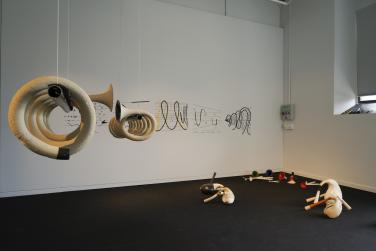Derived from the Greek kybernêtikê, the ‘art of governing’, cybernetics was, in its origins, a technique for control and governance and was used to check and verify the anticipation of moving objects.

Tabakalera is opening a new cycle of contemporary art exhibitions with Cybernetics of the Poor: tutorials, exercises and scores. The exhibition, curated by German cultural critic and curator Diedrich Diederichsen and by the head of Tabakalera's contemporary art department, Oier Etxeberria, proposes an analysis of the various forms of connection that have historically taken place between cybernetics and art. Coproduced by Tabakalera and Kunsthalle Wien, the exhibition displays works by 24 local and international artists, and includes items from private collections, galleries and museums such as the Museo Nacional Centro de Arte Reina Sofía or the Musée d'art contemporain de Lyon.
The exhibition uses the same name as the international seminar held in 2019 between the cities of Vienna and San Sebastian. That collaboration gave rise to this exhibition project, which next December will travel to the Kunsthalle in Vienna. A collaboration which, in addition to creating the possibility of producing new artworks, will offer the chance for several Basque artists to exhibit their work in Vienna.
The starting point for the exhibition “Cybernetics of the Poor: tutorials, exercises and scores” is the idea of the power of cybernetics over the economy and politics. Derived from the Greek kybernêtikê, the ‘art of governing’, cybernetics was, in its origins, a technique for control and governance and was used to check and verify the anticipation of moving objects. American mathematician Norbert Wiener invented it in the 1940s to control traffic and govern large groups of people, and it soon became a method of oppression and control.
Today's situation is quite different. Cybernetics is no longer just a method of control and governance, but is also a business model. Data processing and digital capitalism use the technology or methodology of cybernetics for profit. For its part, art also adapts to this new scenario and reflects on the old and new cybernetics in the exhibition “Cybernetics of the Poor: tutorials, exercises and scores”, an invitation for us to think about what kinds of responses can there be to the planning, anticipation and organisation processes that structure the reality we live in, or what space is there left for art —or the individual— in the face of this absolute power of cybernetics which practically permeates all aspects of our everyday lives. In other words, and referring to the title of the exhibition, how to stray from the score, divert from the tutorials, propose exercises that play around the established order, to reach a different destination.
Among other things, the exhibition includes four newly-produced works that respond to the current cybernetics, and also works by artists of the last fifty years that respond and refute the original idea of cybernetics. In their works, the artists use strategies that can be understood as a “cybernetics of the poor”. The spectator will find a variety of works that refer to music, pop culture, film, sculpture or even activism. The exhibition offers the opportunity to reflect on the complexity of today's world and makes it possible for us to do so through the senses, not just based on an intellectual reading.
The exhibition will have a second phase in December 2020 at the Kunsthalle Wien and will include differentiated adaptations and case studies that start with this exhibition.
This exhibition is curated by Diedrich Diederichsen and Oier Etxeberria.
Participant artists: Agency, Jon Mikel Euba, Lili Reynaud-Dewar, Camila Sposati, Constanze Ruhm, Ana de Almeida & Alicja Rogalska, Gema Intxausti, Luke Fowler, Alex Mendizabal, Sharon Lockhart, Cory Arcangel and Pedro G. Romero.
Works by Don Van Vliet, Cornelius Cardew, Anthony Braxton, Elena Asins, Hanne Darboven, Edgar Degas, Jörg Schlick, Peter Roehr, Douglas Huebler, Heinrich Riebesehl, Mike Kelley y Guy de Cointet entre otros.
Cybernetics of the Poor: tutorials, exercises and scores is the result of the collaboration between TABAKALERA and KUNSTHALLE WIEN. This project has the participation of the Austria Madrid Cultural Forum and the Flanders State of Art.
